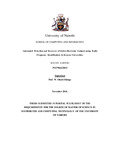| dc.contributor.author | Kariuki, Kelvin | |
| dc.date.accessioned | 2017-01-06T07:50:24Z | |
| dc.date.available | 2017-01-06T07:50:24Z | |
| dc.date.issued | 2016-11 | |
| dc.identifier.uri | http://hdl.handle.net/11295/99489 | |
| dc.description.abstract | The Radio Frequency Identification (RFID) Technology is an important type of wireless sensor network that can be used for automatic detection of stolen electronic gadgets. Advancements in technology in the production of electronics have made more people desire to own devices such as laptops, smart phones, fridges, washing machines among others hence raising their demand not only on the genuine markets but also on the black market. In this research, we develop a model leveraging RFID technology to help end the rapid growth of theft cases involving electronic devices in Kenyan Universities. A prototype is built from the design and deployed using Arduino Mega board and MFRC Arduino card reader. We present our implementation experiences and the experimental results. In order to evaluate the efficiency and accuracy of the proposed system, we also conduct a test-driven simulation based on real data collected from the experiments. This indeed demonstrates that the prototype RFID system can be more efficient and accurate compared to the traditional methods of device ownership verification in large communities such as universities and tertiary institutions, and hence will greatly help in reducing electronic device theft in these institution of higher learning. | en_US |
| dc.language.iso | en | en_US |
| dc.publisher | University of Nairobi | en_US |
| dc.subject | Radio Frequency Identification, Wireless Sensor Networks, Electronics, Arduino. | en_US |
| dc.title | Automated detection and recovery of stolen electronic gadgets using radio frequency identification in Kenyan universities | en_US |
| dc.type | Thesis | en_US |

